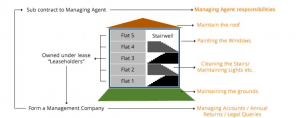In block management, there is often confusion about the roles of freeholders, residents management companies (RMCs) and managing agents. Fortunately, at Scanlans we are experts in residential block management. Throughout this insightful guide, we will explain the key features of these roles and how they work together, offering you all the info you will need to move forward. Keep reading to learn more!
What are Freeholders and Leaseholders?
The freeholder is usually an individual or company that owns the entire building in which you live i.e. your apartment/flat/maisonette etc. The freeholder is responsible for looking after the structure of the building including walls, roofs, etc. The freeholder is also responsible for the grounds and common areas which include gardens, corridors, steps/staircases and parking.
A flat leaseholder is someone who has exclusive possession of a flat in the block for the term of their lease. They are entitled to quiet enjoyment of the flat and have exclusive rights to manage the block accordingly. As a leaseholder, you are also expected to contribute financially towards the management of the building through ground rent or service charge contributions.
What is a Residents Management Company?
A Residents Management Company (RMC) is a non-profit company which manages the building on behalf of all residents. The RMC is responsible for day to day management of the building – i.e. looking after its structure, common areas and gardens, carrying out repairs, health and safety regulations, managing staff and services (i.e. caretakers). RMCs are the link between residents (leaseholders) and the freeholder. They deal with queries, complaints, non-payment of service charges (where applicable), maintenance issues etc. In an RMC, all owners/residents have equal voting rights regardless of the value of their properties.
Residents can also form a Right to Manage (RTM) company to take control of their building. A RTM company differs from a Residents’ Management Company (RMC) because an RMC is set up as part of the lease from the outset. An RTM is often set up by leaseholders when there is no RMC in place already.
Related Reading: A Guide to Block Management Health & Safety Regulations
What is a Managing Agent?
A managing agent can be appointed by the RMC to liaise with freeholders, service providers and other agents on the RMC’s behalf. The managing agent provides services such as preparing budgets for planned works, tendering contracts for work to be carried out and organising payment for any work done on the building. A managing agent is usually a firm of chartered surveyors and can manage and maintain the entire building or just part of it.
Managing agents are used to manage a block of apartments or townhouses. They are responsible for the things that would be done if the freeholders were doing them themselves, such as arranging repairs and maintenance, organising cleaners/pest inspectors and executing site visits.
They also take care of all financial matters such as keeping accurate records and issuing monthly statements, rent collection and arrears management, lease renewals, service charge account maintenance etc. They will ensure that the accounts are submitted to the Landlord for auditing on a regular basis, draw up service charge budgets and ensure that quotations are obtained before any additional works are carried out. The agent will be there to provide support and advice, and deal with tenants or other factors which may cause problems for the freeholder.
How Do Freeholders, RMCs and Managing Agents Work Together in Block Management?
In residential block management, the freeholder will lease properties in the block to leaseholders. Leaseholders can form an RMC to manage the building, and sub contract a managing agent to liaise with the freeholders. For clarity, the graphic below shows a clear depiction of the ways in which freeholders, RMCs and managing agents work together in block management.
You Might Be Interested In: A Guide to Residential Block Management Services
Other FAQs
Can a Freeholder Appoint a Managing Agent?
A managing agent can be employed by either the Freeholder, the RMC or RTM, whether the RMC or RTM owns the freehold or not. Freeholders are able to appoint managing agents to directly manage their block. The process is straightforward and once the freeholder has found an agent, they often negotiate a short contract or informally agree on terms. The managing agent will normally charge a fee for overseeing the day to day running of the block, collecting service charges and liaising with contractors if any work needs done.
How Do I Appoint a Property Managing Agent?
Appointing a managing agent should be done in consultation with the freeholders of the block. In some instances, RMCs may also be involved. A Managing Agent should have a proven track record within the field and be registered with an accredited Scheme Management Company (SMC). An SMC is responsible for ensuring that it has all of the necessary legal documentation to allow it to manage a block.
What is Ground Rent?
Ground rent is money paid by leaseholders to the freeholder on an annual basis. It can be seen as a type of leasehold tenure, similar to the system which exists for flats. The payment of ground rent provides investment income to development owners, helping them offset any costs involved in developing the site and/or retaining ownership of it.
How is the Building Insured?
Typically, the lease on a block of flats requires the freeholder to provide the insurance, with each leaseholder paying a proportion of the premium as part of their service charge, according to this guide from the Federation of Private Residents Association (FPRA),
Should I Outsource Block Management Services?
Outsourcing your block management services will free up your time so that you can focus on what is really important for growing your wealth and revenue. For example, by freeing up the management of your building from an RMC or freeholder, it will allow you to have more time to focus on strategic investments and revenue generation. In addition, a great property management company will be able to save the owner money and increase the return on investment (ROI).
What Should I Look For When Choosing a Block Management Services?
Good residential block management services will be able to back up their services with expert qualifications and certifications. Standout management services will not only be members of the Association of Residential Managing Agents (ARMA) but will also be Royal Institution of Chartered Surveyors (RICS) members too. Ensuring you employ services with these standout attributes maximise the efficiency of your property management and minimise potential mistakes.
You should also look out for great testimonials, reviews and client case studies. Trust proven results over unreliable guarantees.
Interested in Hiring Expert Residential Block Management?
At Scanlans, we have over 25 years of proven experience and expertise in property management. All of our block managers are members of the Association of Residential Managing Agents (ARMA) and the Royal Institution of Chartered Surveyors (RICS) which means we only operate to the very highest industry standards.
Request a Call From Us Today or Take a Look at Our Residential Block Management Services To Learn More!











Leave A Comment
You must be logged in to post a comment.